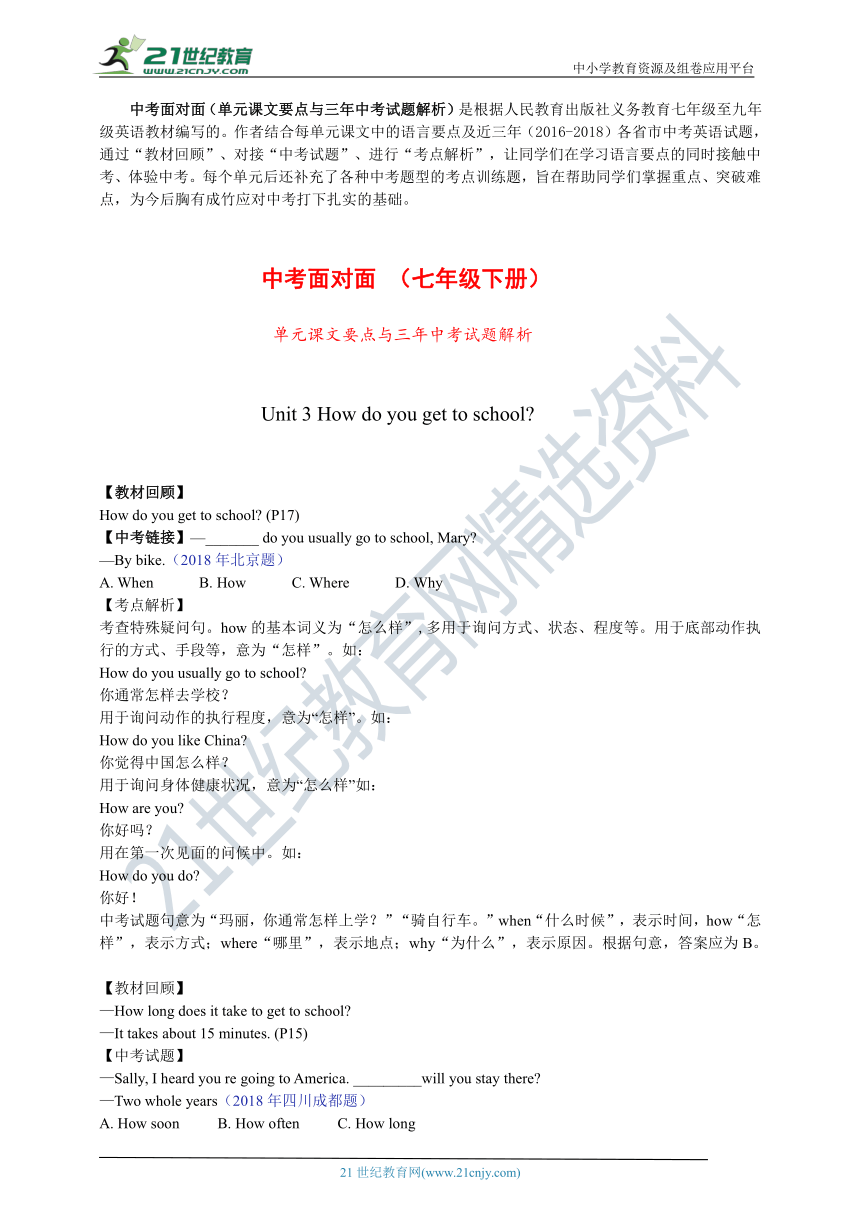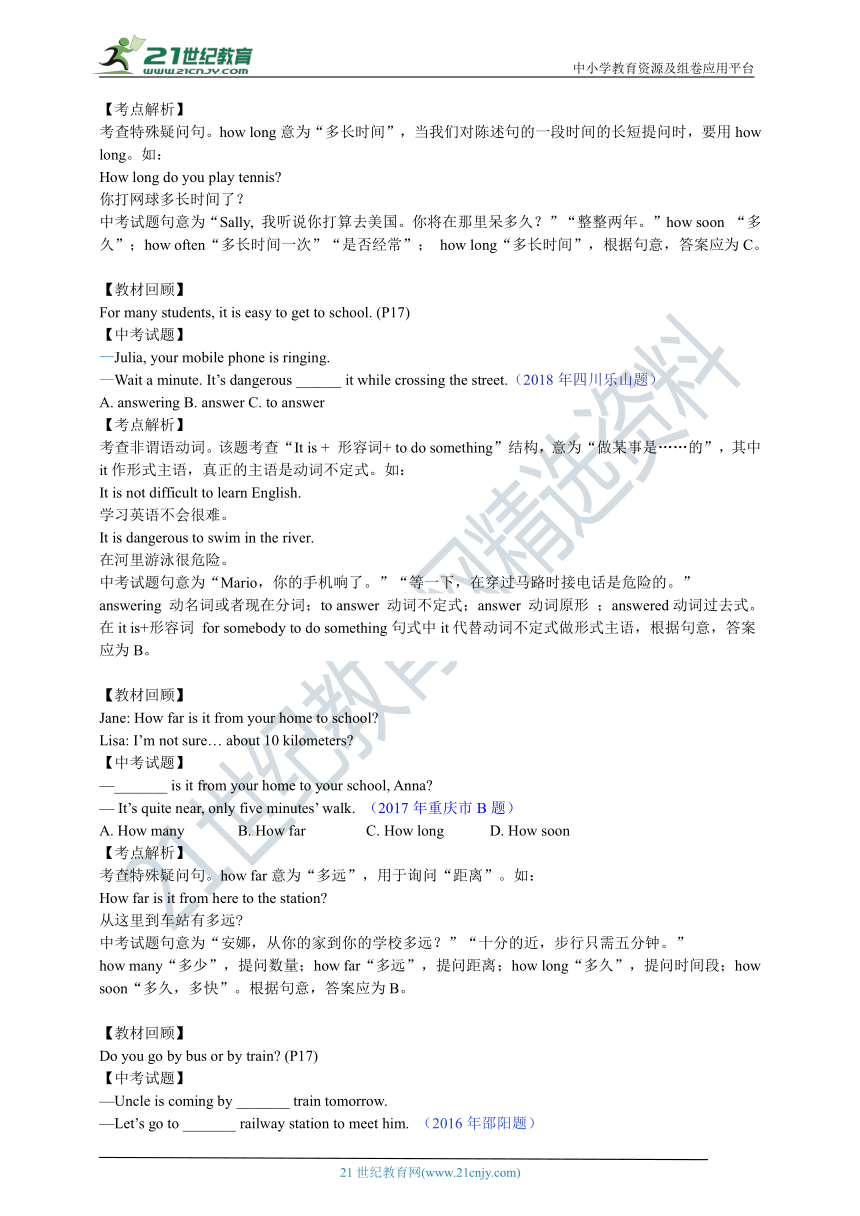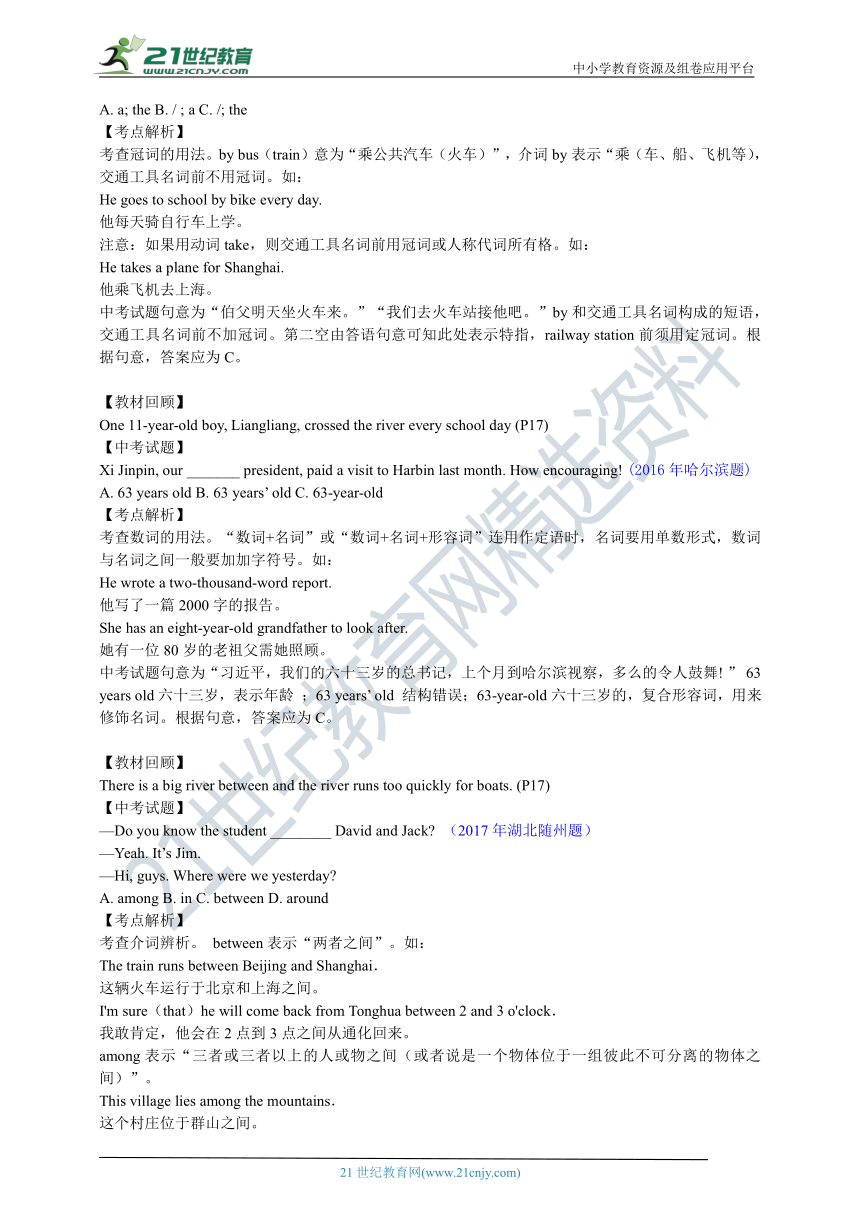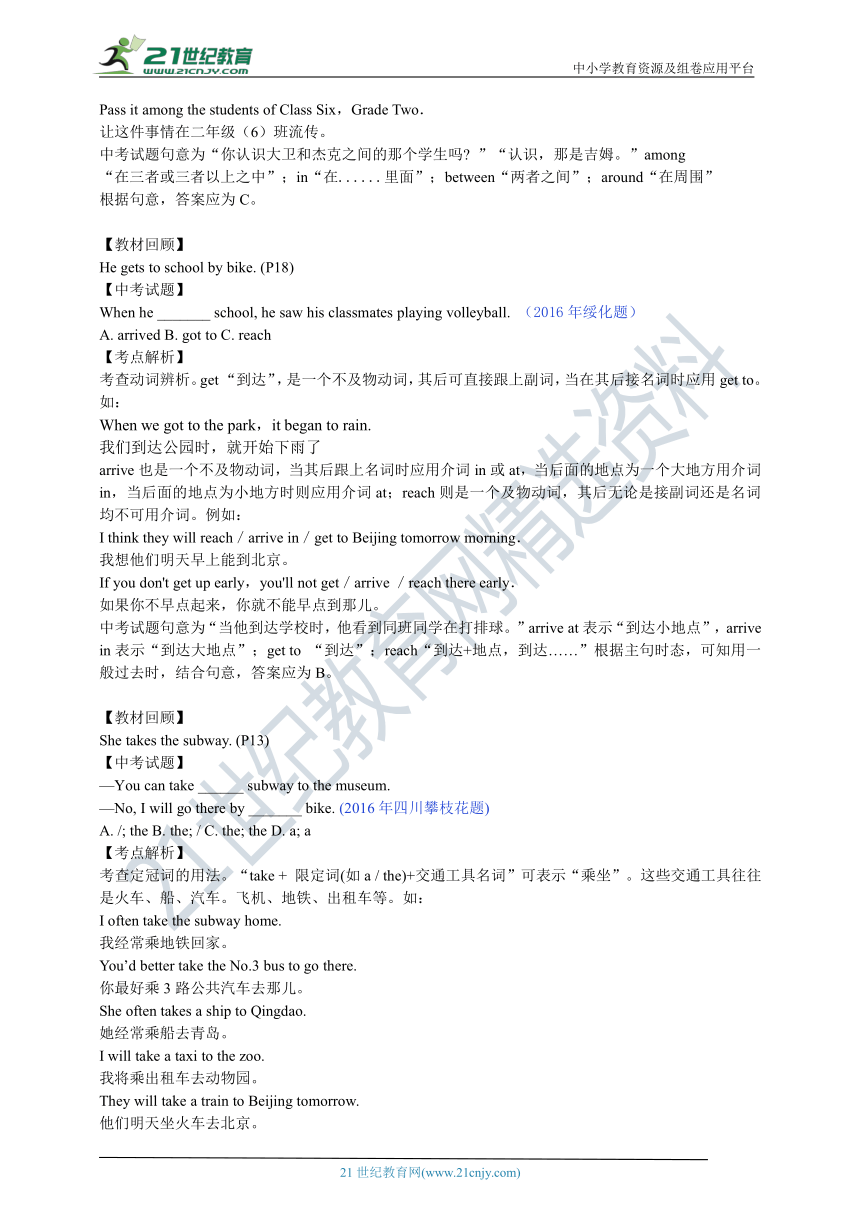中考面对面七年级下册Unit 3 How do you get to school?(单元课文要点与三年中考试题解析+考点训练题)
文档属性
| 名称 | 中考面对面七年级下册Unit 3 How do you get to school?(单元课文要点与三年中考试题解析+考点训练题) |

|
|
| 格式 | zip | ||
| 文件大小 | 1.2MB | ||
| 资源类型 | 试卷 | ||
| 版本资源 | 人教新目标(Go for it)版 | ||
| 科目 | 英语 | ||
| 更新时间 | 2019-03-20 00:00:00 | ||
图片预览




文档简介
中小学教育资源及组卷应用平台
中考面对面(单元课文要点与三年中考试题解析)是根据人民教育出版社义务教育七年级至九年级英语教材编写的。作者结合每单元课文中的语言要点及近三年(2016-2018)各省市中考英语试题,通过“教材回顾”、对接“中考试题”、进行“考点解析”,让同学们在学习语言要点的同时接触中考、体验中考。每个单元后还补充了各种中考题型的考点训练题,旨在帮助同学们掌握重点、突破难点,为今后胸有成竹应对中考打下扎实的基础。
中考面对面 (七年级下册)
单元课文要点与三年中考试题解析
Unit 3 How do you get to school?
【教材回顾】
How do you get to school? (P17)
【中考链接】—_______ do you usually go to school, Mary?
—By bike.(2018年北京题)
A. When B. How C. Where D. Why
【考点解析】
考查特殊疑问句。how的基本词义为“怎么样”,多用于询问方式、状态、程度等。用于底部动作执行的方式、手段等,意为“怎样”。如:
How do you usually go to school?
你通常怎样去学校?
用于询问动作的执行程度,意为“怎样”。如:
How do you like China?
你觉得中国怎么样?
用于询问身体健康状况,意为“怎么样”如:
How are you?
你好吗?
用在第一次见面的问候中。如:
How do you do?
你好!
中考试题句意为“玛丽,你通常怎样上学?”“骑自行车。”when“什么时候”,表示时间,how“怎样”,表示方式;where“哪里”,表示地点;why“为什么”,表示原因。根据句意,答案应为B。
【教材回顾】
—How long does it take to get to school?
—It takes about 15 minutes. (P15)
【中考试题】
—Sally, I heard you re going to America. _________will you stay there?
—Two whole years(2018年四川成都题)
A. How soon B. How often C. How long
【考点解析】
考查特殊疑问句。how long意为“多长时间”,当我们对陈述句的一段时间的长短提问时,要用how long。如:
How long do you play tennis?
你打网球多长时间了?
中考试题句意为“Sally, 我听说你打算去美国。你将在那里呆多久?”“整整两年。”how soon “多久”;how often“多长时间一次”“是否经常”; how long“多长时间”,根据句意,答案应为C。
【教材回顾】
For many students, it is easy to get to school. (P17)
【中考试题】
—Julia, your mobile phone is ringing.
—Wait a minute. It’s dangerous ______ it while crossing the street.(2018年四川乐山题)
A. answering B. answer C. to answer
【考点解析】
考查非谓语动词。该题考查“It is + 形容词+ to do something”结构,意为“做某事是……的”,其中it作形式主语,真正的主语是动词不定式。如:
It is not difficult to learn English.
学习英语不会很难。
It is dangerous to swim in the river.
在河里游泳很危险。
中考试题句意为“Mario,你的手机响了。”“等一下,在穿过马路时接电话是危险的。”
answering 动名词或者现在分词;to answer 动词不定式;answer 动词原形 ;answered动词过去式。在it is+形容词 for somebody to do something句式中it代替动词不定式做形式主语,根据句意,答案应为B。
【教材回顾】
Jane: How far is it from your home to school?
Lisa: I’m not sure… about 10 kilometers?
【中考试题】
—_______ is it from your home to your school, Anna?
— It’s quite near, only five minutes’ walk. (2017年重庆市B题)
A. How many B. How far C. How long D. How soon
【考点解析】
考查特殊疑问句。how far意为“多远”,用于询问“距离”。如:
How far is it from here to the station?
从这里到车站有多远?
中考试题句意为“安娜,从你的家到你的学校多远?”“十分的近,步行只需五分钟。”
how many“多少”,提问数量;how far“多远”,提问距离;how long“多久”,提问时间段;how soon“多久,多快”。根据句意,答案应为B。
【教材回顾】
Do you go by bus or by train? (P17)
【中考试题】
—Uncle is coming by _______ train tomorrow.
—Let’s go to _______ railway station to meet him. (2016年邵阳题)
A. a; the B. / ; a C. /; the
【考点解析】
考查冠词的用法。by bus(train)意为“乘公共汽车(火车)”,介词by表示“乘(车、船、飞机等),交通工具名词前不用冠词。如:
He goes to school by bike every day.
他每天骑自行车上学。
注意:如果用动词take,则交通工具名词前用冠词或人称代词所有格。如:
He takes a plane for Shanghai.
他乘飞机去上海。
中考试题句意为“伯父明天坐火车来。”“我们去火车站接他吧。”by和交通工具名词构成的短语,交通工具名词前不加冠词。第二空由答语句意可知此处表示特指,railway station前须用定冠词。根据句意,答案应为C。
【教材回顾】
One 11-year-old boy, Liangliang, crossed the river every school day (P17)
【中考试题】
Xi Jinpin, our _______ president, paid a visit to Harbin last month. How encouraging! (2016年哈尔滨题)
A. 63 years old B. 63 years’ old C. 63-year-old
【考点解析】
考查数词的用法。“数词+名词”或“数词+名词+形容词”连用作定语时,名词要用单数形式,数词与名词之间一般要加加字符号。如:
He wrote a two-thousand-word report.
他写了一篇2000字的报告。
She has an eight-year-old grandfather to look after.
她有一位80岁的老祖父需她照顾。
中考试题句意为“习近平,我们的六十三岁的总书记,上个月到哈尔滨视察,多么的令人鼓舞! ” 63 years old六十三岁,表示年龄 ;63 years’ old 结构错误;63-year-old六十三岁的,复合形容词,用来修饰名词。根据句意,答案应为C。 ?
【教材回顾】
There is a big river between and the river runs too quickly for boats. (P17)
【中考试题】
—Do you know the student ________ David and Jack? (2017年湖北随州题)
—Yeah. It’s Jim.
—Hi, guys. Where were we yesterday?
A. among B. in C. between D. around
【考点解析】
考查介词辨析。 between表示“两者之间”。如:
The train runs between Beijing and Shanghai.
这辆火车运行于北京和上海之间。
I'm sure(that)he will come back from Tonghua between 2 and 3 o'clock.
我敢肯定,他会在2点到3点之间从通化回来。
among表示“三者或三者以上的人或物之间(或者说是一个物体位于一组彼此不可分离的物体之间)”。
This village lies among the mountains.
这个村庄位于群山之间。
Pass it among the students of Class Six,Grade Two.
让这件事情在二年级(6)班流传。
中考试题句意为“你认识大卫和杰克之间的那个学生吗? ”“认识,那是吉姆。”among
“在三者或三者以上之中”;in“在......里面”;between“两者之间”;around“在周围”
根据句意,答案应为C。
【教材回顾】
He gets to school by bike. (P18)
【中考试题】
When he _______ school, he saw his classmates playing volleyball. (2016年绥化题)
A. arrived B. got to C. reach
【考点解析】
考查动词辨析。get “到达”,是一个不及物动词,其后可直接跟上副词,当在其后接名词时应用get?to。如:
When we got to the park,it began to rain.
我们到达公园时,就开始下雨了
arrive也是一个不及物动词,当其后跟上名词时应用介词in或at,当后面的地点为一个大地方用介词in,当后面的地点为小地方时则应用介词at;reach则是一个及物动词,其后无论是接副词还是名词均不可用介词。例如:?
I?think?they?will?reach/arrive?in/get?to?Beijing?tomorrow?morning.?
我想他们明天早上能到北京。?
If?you?don't?get?up?early,you'll?not?get/arrive?/reach?there?early.?
如果你不早点起来,你就不能早点到那儿。
中考试题句意为“当他到达学校时,他看到同班同学在打排球。”arrive at表示“到达小地点”,arrive in表示“到达大地点”;get to “到达”;reach“到达+地点,到达……”根据主句时态,可知用一般过去时,结合句意,答案应为B。
【教材回顾】
She takes the subway. (P13)
【中考试题】
—You can take ______ subway to the museum.
—No, I will go there by _______ bike. (2016年四川攀枝花题)
A. /; the B. the; / C. the; the D. a; a
【考点解析】
考查定冠词的用法。“take + 限定词(如a / the)+交通工具名词”可表示“乘坐”。这些交通工具往往是火车 (?http:?/??/?www.so.com?/?s?q=%E7%81%AB%E8%BD%A6&ie=utf-8&src=internal_wenda_recommend_textn" \t "https:?/??/?wenda.so.com?/?q?/?_blank?)、船、汽车 (?http:?/??/?www.so.com?/?s?q=%E6%B1%BD%E8%BD%A6&ie=utf-8&src=internal_wenda_recommend_textn" \t "https:?/??/?wenda.so.com?/?q?/?_blank?)。飞机 (?http:?/??/?www.so.com?/?s?q=%E9%A3%9E%E6%9C%BA&ie=utf-8&src=internal_wenda_recommend_textn" \t "https:?/??/?wenda.so.com?/?q?/?_blank?)、地铁 (?http:?/??/?www.so.com?/?s?q=%E5%9C%B0%E9%93%81&ie=utf-8&src=internal_wenda_recommend_textn" \t "https:?/??/?wenda.so.com?/?q?/?_blank?)、出租车 (?http:?/??/?www.so.com?/?s?q=%E5%87%BA%E7%A7%9F%E8%BD%A6&ie=utf-8&src=internal_wenda_recommend_textn" \t "https:?/??/?wenda.so.com?/?q?/?_blank?)等。如:
I often take the subway home.
我经常乘地铁回家。
You’d better take the No.3 bus to go there.
你最好乘3路公共汽车 (?http:?/??/?www.so.com?/?s?q=%E5%85%AC%E5%85%B1%E6%B1%BD%E8%BD%A6&ie=utf-8&src=internal_wenda_recommend_textn" \t "https:?/??/?wenda.so.com?/?q?/?_blank?)去那儿。
She often takes a ship to Qingdao.
她经常乘船去青岛。
I will take a taxi to the zoo.
我将乘出租车去动物园 (?http:?/??/?www.so.com?/?s?q=%E5%8E%BB%E5%8A%A8%E7%89%A9%E5%9B%AD&ie=utf-8&src=internal_wenda_recommend_textn" \t "https:?/??/?wenda.so.com?/?q?/?_blank?)。
They will take a train to Beijing tomorrow.
他们明天坐火车 (?http:?/??/?www.so.com?/?s?q=%E5%9D%90%E7%81%AB%E8%BD%A6&ie=utf-8&src=internal_wenda_recommend_textn" \t "https:?/??/?wenda.so.com?/?q?/?_blank?)去北京。
Did you take a plane?
你坐过飞机吗?
He takes a car home every day.
他每天坐车回家。
中考试题句意为“你可以坐地铁去博物馆。”“不,我将骑自行车去那里。”表示“坐地铁”应该说take the subway;骑自行车可用介词短语by bike,该短语bike前不用冠词。答案应为B。
【教材回顾】
How long does it take to get home? (P15)
【中考试题】
It will _______ the workers ten days to finish all the work. (2016年绥化题)
A. take B. spend C. pay
【考点解析】
考查动词辨析。take常用于“占用、花费”时间,其主语通常为形式主语“it”或物。如:
It?takes/took?somebody some?time?to?do?something=Something.takes?somebody some?time.??例如:
It?took?me?three?years?to?draw?the?beautiful?horses.
画这些漂亮的马花费了我3年时间。
The?work?will?take?me?two?days.
这项工作花了2天时间。
spend的主语通常是人,往往用于以下句型:
somebody spends?some?money/some?time?on?something.
Somebody spends?some?money/some?time(in)doing?something 如:
I?spent?fifty?yuan?on?the?coat.
?=?I?spent?fifty?yuan?(in)?buying?the?coat.
我花50元买了这件大衣。
He?spent?three?days?on?the?work.?
=?He?spend?three?days?(in)?doing?the?work.?
我干这项工作用了3天。
pay为“付款、赔偿”之意,主语通常是人,往往是sb.?pays?some?money?for?sth或pay?sb.(some?money?for?sth)?例如:
I?paid?fifty?yuan?for?the?coat.
我花50元买了这件大衣。
He?has?paid?the?doctor?50?pounds?for?the?medicine???
他买药已付医生50英镑。
How?much?did?you?pay?him????
你付他多少钱?
中考试题句意为“工人们完成所有的工作要花十天时间。”此题由it作形式主语,该用动词take,根据句意,答案应为A。
【教材回顾】
But for many students in one small village in China, it is difficult. (P17)
【中考试题】
Jim lives _____ a small village and the air there is very fresh. (2016年重庆B卷)
A. on B. in C. under D. from
【考点解析】
考查介词辨析。介词in表示“在……里”,表示位置。如:
Her parents live in China.
她父母住在中国。
There are three pencils in the pencil box.
铅笔盒里有三支铅笔。
中考试题句意为“吉姆住在一个小村庄,空气很新鲜。”on“在……之上”;in“在……里面”;under“在……下面”;from“来自”。答案应为B。 ?
【教材回顾】
Lisa: Yeah. Well, have a good day at school. (P14)
【中考试题】
—My friends and I will go fishing today.
— (2017年天津题)
A. My pleasure. B. Thanks a lot. C. Have a nice day! D. Nice to meet you.
【考点解析】
考查交际用语。have a good day意为“过得好”;“过得快乐”,是固定短语,介词a不可省略。如:
They have a good day at school.
他们在学校过得好。
Have a good day at work!
中考试题句意为“今天我和我的朋友们将去钓鱼。”“祝你今天愉快。”My pleasure “我很荣幸”;Thanks a lot “非常感谢”;Have a nice day! “祝你今天愉快”;Nice to meet you “很高兴见到你”。根据句意,答案应为C。
考点训练题
一、填空
A)用how long, how far, how填空。
1.—_______ do you often get to school, Michael?
—On foot.
2.—_______ is it from your home to school?
—It’s about ten minutes’ walk.
3.—_______ will the 6the Chinese Film Festival in France last?
—From May 24th to July 19th.
4.—_______ does it take you to get to school by bike?
—About fifteen minutes.
5.—_______ is it from Suqian to Jiuzhai valley?
—About 1,200 kilometers away. But I’m not sure.
二、翻译句子
1.我每天通常花一个小时做作业。(用动词take)
_____________________________
2.骑自行车很有趣。
_____________________________
3.他坐在汤姆和杰克之间。
_____________________________
4.祝你过得愉快,艾丽斯!
_____________________________
5.她每天坐地铁去上班。
_____________________________
三、改错
1.She has an eight-years-old grandfather to look after.
A B C D
2. My brother goes to school by a bus and my sister goes to school on foot.
A B C D
3. When she arrived at home she had a short rest and a cup of water.
A B C D
4. It takes me about forty minutes in getting to the cinema.
A B C D
5. He wants to take train to get to school in future.
A B C D
四、选择填空
1.—We learned the differences _______ fact and opinion.
A.between B. among C. during D. beyond
2.I usually go to work _______ subway.
A. on B. in C. by D. at
3.—do you go to work?
—I take the bus.
A. When B. Where C. How D. What time
4.—Excuse me, sir. _______ is it from here to the hospital?
—About ten minutes’ walk.
A. How much B. How far C. How long D. How many
5.For many students _______is not easy to learn maths well.
A. it B. this C. that D. he
key:
一、
1.How
2.How far
3.How long
4.How long
5. How far
二、
1.It usually takes me an hour to do homework.
2.It is interesting to take a bike ride.
3.He sits between Tom and Jack.
4. Have a good day, Alice!
5.She take the subway to work every day.
三、
1.C(eight-year-old) 2. C(bus) 3.B(去掉at) 4.C(to get) 5.B(take the train)
四、
ACCBA
21世纪教育网 www.21cnjy.com 精品试卷·第 2 页 (共 2 页)
HYPERLINK "http://21世纪教育网(www.21cnjy.com)
" 21世纪教育网(www.21cnjy.com)
同课章节目录
- Unit 1 Can you play the guitar?
- Section A
- Section B
- Unit 2 What time do you go to school?
- Section A
- Section B
- Unit 3 How do you get to school?
- Section A
- Section B
- Unit 4 Don't eat in class.
- Section A
- Section B
- Unit 5 Why do you like pandas?
- Section A
- Section B
- Unit 6 I'm watching TV.
- Section A
- Section B
- Review of Units 1-6
- Unit 7 It's raining!
- Section A
- Section B
- Unit 8 Is there a post office near here?
- Section A
- Section B
- Unit 9 What does he look like?
- Section A
- Section B
- Unit 10 I'd like some noodles.
- Section A
- Section B
- Unit 11 How was your school trip?
- Section A
- Section B
- Unit 12 What did you do last weekend?
- Section A
- Section B
